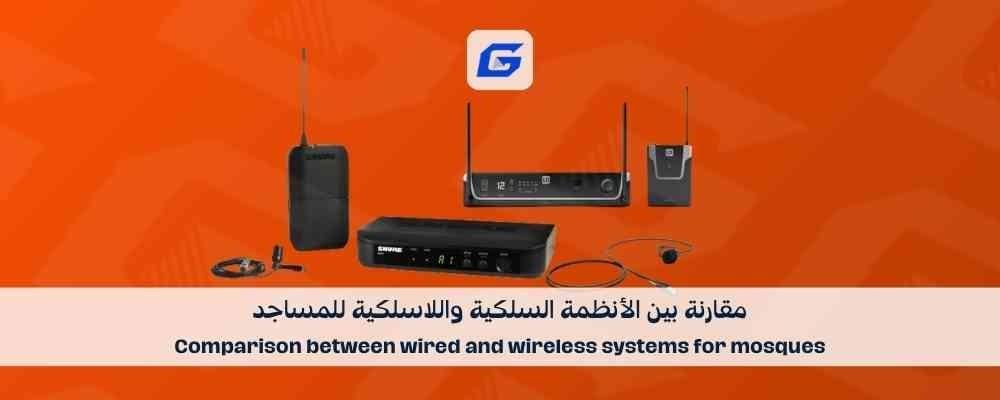When equipping mosques with sound systems, a decision must be made between wired and wireless systems. Both options have their advantages and disadvantages, and the choice depends on the needs of the mosque, its size, and the management’s preferences. In this article, we provide a comprehensive comparison of wired and wireless systems for mosques to help you make the right decision.
First: Wired systems
Advantages
- Connection stability
- Wired systems provide high stability in uninterrupted audio transmission.
- High sound quality
- Reduces distortion or interference, ensuring clear and pure sound.
- lower cost
- They are often less expensive than wireless systems to install and maintain.
- longer life
- Wired systems last longer with proper maintenance.
Disadvantages
- Difficulty of installation
- It requires running cables across the mosque, which can be expensive and labor intensive.
- Limited flexibility
- Wired systems are less flexible when devices need to be redistributed or relocated.
- cable mess
- Exposed wires may affect the aesthetic appearance of the mosque and cause obstructions to movement.
Second: Wireless systems
Advantages
- High flexibility
- Devices can be easily moved without the need for wires, making it easy to adjust and rearrange.
- Stylish look
- There are no exposed cables, making the interior more organized.
- Easy to install
- No need to extend cables, reducing installation time and effort.
- Scalability
- New devices can be easily added without major modifications.
Disadvantages
- Potential interference
- Susceptible to interference with other devices operating on the same frequency.
- Battery based
- Wireless devices need to change batteries regularly, which increases operating costs.
- higher cost
- Wireless devices typically cost more than wired systems.
- Risks of disconnection
- You may experience interruptions if there are obstacles or signal interference.
Factors for choosing between the two systems
1. Size of the mosque
- In larger mosques, wireless systems may be more practical due to their flexibility.
- In small mosques, wire systems are an economical and stable option.
2. Nature of the events
- If the mosque hosts multiple activities or needs to move devices frequently, wireless systems are the best fit.
- For routine activities, wired systems offer a stable and efficient solution.
3. Available budget
- Wired systems are suitable when there are financial constraints, while wireless systems require a larger investment.
4. Interference with other devices
- Mosques near sources of radiation interference (such as wireless networks) may experience problems with wireless systems.
The perfect choice for mosques
For best results, it may be beneficial to use a combination of wired and wireless systems. For example:
- Use wired systems to connect fixed speakers.
- Use wireless systems for portable microphones or mobile events.
conclusion
Both wired and wireless systems are effective, and the best choice depends on the needs of the mosque and the preferences of the management. Understanding the advantages and disadvantages of each system can help you make the right decision to ensure clear audio and a comfortable spiritual experience for worshippers.
Post Cover Description
Cover showing a modern mosque with a mix of wired and wireless systems. The image highlights the speakers installed next to wireless microphones on the imam's pulpit, with an elegant interior design reflecting the harmony between beauty and technology.

